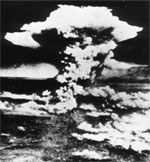Voices
 Mahbub ul Haq
Mahbub ul Haq
Across the border, Mahabub ul Haq of Islamabad's Human Development Centre, former finance minister of Pakistan and an eminent name in the development arena, was severely critical of the nuclear tests by India and Pakistan. "With the explosions, we have made sure that our future generations remain illiterate and poverty continues more acutely. The race for a bleak future starts with these nuclear tests." He said the social cost of the nuclear tests will be internal deficiency due to pumping of more money into the nuclear programme. "Sanctions will not contribute to much hardships. However, to maintain a nuclear arsenal, you have to pump in a huge amount of money. From where are you going to get it?"
Anupam Mishra
Anupam Mishra of the environment cell of Gandhi Peace Foundation, New Delhi, sees the euphoria over India's going nuclear as a sorry state of affairs. "How will you bomb Lahore and save Amritsar from the effects of radiation? Similarly, how can Pakistan bomb Rajasthan and save Sindh?" he queries. "Two bombs is as ridiculous an idea as the two-nation theory," he emphasised. "If the government would have built a hundred talabs (ponds) in the Thar desert, that would have been a real bomb," he quipped.
Cluade Alvares
Claude Alvares, Goa-based environmental campaigner, said the whole scenario had become very depressing. "This place has become insecure. What are the enemies that require this type of arsenals, I do not know. People who need this sort of weapons must be profoundly insecure," he said. "If this is the way our society wants to get some estimation (in the community of nations) by adopting something which is now not desired by anybody, then we've lost already", he added. "After we've gone ahead and polluted our air, water, rivers and denuded our forest areas, what is there to protect anywhere," he questioned angrily. "We've really reached the bottom of the bottom of the bottom of the pit."
Rajiv Vohra
Rajiv Vohra, editor of Gandhi Marg , says that he is principally against nuclear testing. He sees this as a mark of India's decline in the last 200 years. At the same time, he insisted that the industrialised West was also responsible for bringing India to this stage. "The West wants to control the two most basic elements of existence - food and security. In the idiom of the West, peace means disarming others and arming themselves," Vohra reiterated.
Amit Sengupta
Amit Sengupta, convenor of Delhi Science Forum, said: "As far as priority is concerned, other faculties of science will be left behind once we start weaponisation of nuclear power. The sanctions against India will affect the environment and social projects funded by foreign countries. Also, India is not going to fund these projects. Even though the amount involved is comparatively less, it would affect a sensitive sector, the rural areas."
The Science Society of India
The Science Society of India, a forum of intellectuals and social scientists from Andhra Pradesh, Tamil Nadu and Karnataka, organised a debate on the impact of the nuclear weaponisation in Bangalore late last month. The panel comprised academicians, Gandhian activists and scientists from the Indian Institute of Science ( iis c) Bangalore. Sanjoy Biswas of the iis c, who chaired the panel declared that the entire panel was anti-nuclear. "The arms race started by the government is going to cost us about Rs 30,000 crore over and above the existing defence budget in the next 10-year period," he declared. M R N Murthy, professor of biology at the iis c, said the horrors of a nuclear bomb were more of a tragedy than the high costs. Dwelling on rekindling our cultural coexistence with our neighbours, Murthy said, "After all, as a biologist I can say we have a close genetic familiarity with Pakistan."
D P Sengupta
D P Sengupta, professor of physics at the iis c, voiced concern over the turn Indian science is now taking. "There have been achievements in computer and software technology and many other areas which have gone unlauded. There are far more pressing problems in industry, agriculture and power that science needs to address. Yet a nuclear bomb blast - the technology for which is not new, has the Prime Minister saying Jai Jawan , Jai Kisan , Jai Vigyan (Hail Soldier, Hail Farmer, Hail Science)," he pointed out. He added that the state of both Kisan and Vigyan was in doubt. "Farmers are committing suicide, while science has had to manage on an inequitable budget allocation of 65 per cent for the Defence Research and Development Organisation and less than 2 per cent each for health and education." He expressed deep concern over what the sky-rocketing costs of weaponisation will do to these already-neglected fields. "We cannot afford not to keep abreast with the world in all the areas of science and technology."
Related Content
- The Bikaner Development Authority Bill, 2025
- Zimbabwe gender assessment
- Leveraging technologies for gender equality in mining communities: case studies from the Democratic Republic of the Congo, South Africa, and Peru
- Real-world solutions for clean air and health: six city examples to inspire action on urban air pollution
- India-Africa in G21: the challenge of nutrition security
- Empowering subnational approaches through multilateralism to combat climate change
